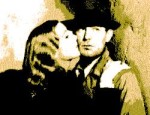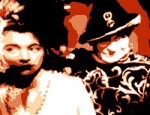Film Review
For an actress who is known to be a compulsive neurotic and control-freak,
Joan Crawford is well suited to play the wife from Hell in this bleak
melodrama from director Vincent Sherman. As the vile
manipulating Mrs Craig, Crawford plays psychotic villainy with such
conviction that you'd think it was about to go out of fashion.
Here is a fire-breathing dragon that would have put the fear of God
into St George and had him beating the hastiest of retreats if it had
crossed his path. This is Crawford at her indomitable best.
But as she draws deeply from the well of venality, she comes
dangerously close to self-parody.
And therein lies the problem with this film, the third screen
adaptation of George Kelly's Prize-winning play. Crawford is just
so horrible to her entourage that it is hard to believe not only that
her husband still accepts her as his wife but that she has somehow
eluded having her head smashed in with her precious Ming vase.
The fault lies not in Crawford's performance, which is spellbinding in
its visceral nastiness, but in the screenplay, which fails to paint
Harriet as anything other than an unsympathetic character.
So caricatured is Crawford's character that at times the film feels
more like black comedy than melodrama (although that may have been the
intention). A top notch cast - which includes Ellen Corby of
The Waltons fame - give their all
in what occasionally seems like a Shakespearean tragedy (with the main
protagonist being a strange hybrid of Richard
III and Lady Macbeth).
Although the characterisation and plot teeter on the brink of
absurdity, the quality of the performances, particularly from Crawford
and her co-star Wendell Corey, makes this a compelling and disturbing
portrait of marital disharmony. Sherman's previous collaboration with
Crawford,
The Damned Don't Cry (1950),
is just as memorable.
© James Travers 2009
The above content is owned by frenchfilms.org and must not be copied.
Film Synopsis
Harriet Craig runs her household with an iron grip. Every last
thing must go as she plans it, her authority is absolute, and she makes
sure that her servants know it. Her husband Walter accepts his
wife's domineering ways because he loves her and knows that she loves
him. Harriet is not a bad woman, he believes; she merely wants to
give him a comfortable home, and it isn't her fault that she can't give
him children. Harriet's live-in cousin is equally tolerant of the
shrewish head of the household and believes her when she says that the
man she is in love with is merely toying with her affections. But
Walter begins to see a different side to his wife when she contrives to
ruin his chance of promotion...
© James Travers
The above content is owned by frenchfilms.org and must not be copied.



